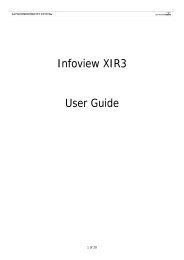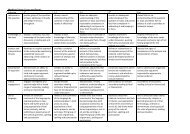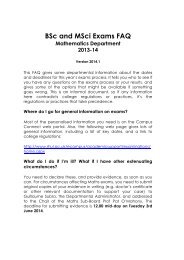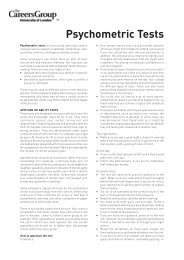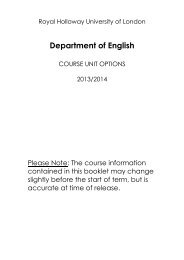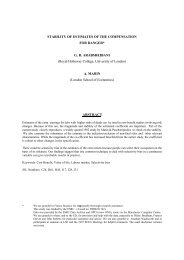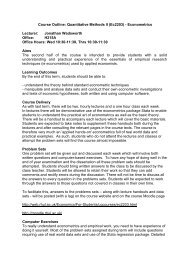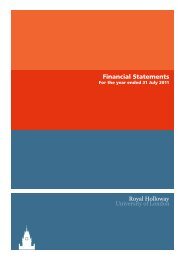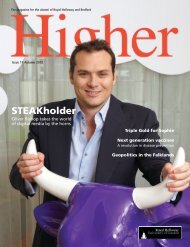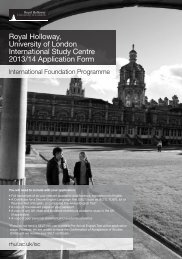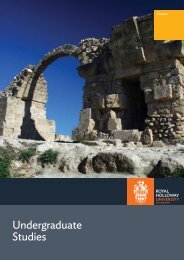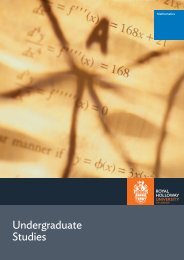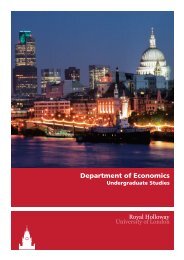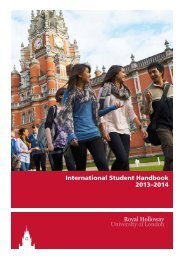a short history of the ISG - Royal Holloway, University of London
a short history of the ISG - Royal Holloway, University of London
a short history of the ISG - Royal Holloway, University of London
You also want an ePaper? Increase the reach of your titles
YUMPU automatically turns print PDFs into web optimized ePapers that Google loves.
The Information Security Group - A Brief History<br />
members <strong>of</strong> <strong>the</strong> <strong>ISG</strong> show, now covers an impressively wide range <strong>of</strong> Information Security<br />
topics. In parallel with <strong>the</strong> MSc, <strong>the</strong> early PhD programme in ma<strong>the</strong>matical cryptography<br />
and discrete ma<strong>the</strong>matics thrived and expanded into o<strong>the</strong>r (ma<strong>the</strong>matical and computer<br />
science) areas related to information security. Members <strong>of</strong> <strong>the</strong> <strong>ISG</strong> have supervised well<br />
over 100 successful PhD students.<br />
Changes and developments have multiplied rapidly since 2000, and this brief <strong>history</strong> does<br />
not attempt to list all <strong>the</strong> developments over <strong>the</strong> last eight years. We conclude by simply<br />
listing a few <strong>of</strong> <strong>the</strong> most important developments in that time:<br />
• The <strong>ISG</strong> grew dramatically from <strong>the</strong> year 2000. The number <strong>of</strong> full time academic<br />
appointments rose to 20; <strong>the</strong>re have been 8 visiting pr<strong>of</strong>essors and more than 20<br />
post doctoral research assistants. In addition <strong>the</strong> number <strong>of</strong> PhD students<br />
registered at a given time rose to about 60.<br />
• The range <strong>of</strong> courses <strong>of</strong>fered as part <strong>of</strong> <strong>the</strong> Masters degree has continued to<br />
expand. In 1992 <strong>the</strong>re were 4 core and 4 options modules. Between 1996 and<br />
2008 <strong>the</strong> following modules have been added<br />
1. Legal and Regulatory Aspects <strong>of</strong> Electronic Commerce<br />
2. Security Technologies<br />
3. Computer Crime<br />
4. Smart Cards/Tokens Security and Applications<br />
5. S<strong>of</strong>tware Security (development funded by Micros<strong>of</strong>t )<br />
6. Trusted Computing (development funded by <strong>the</strong> EU as part <strong>of</strong> <strong>the</strong> Open<br />
Trusted Computing project)<br />
In 2008, development work started on two optional modules to cover Forensics and<br />
Penetration Testing, with an intended start date <strong>of</strong> 2009/10.<br />
• In order to accommodate <strong>the</strong> need <strong>of</strong> students with interests focused on e-<br />
commerce, an MSc in Secure Electronic Commerce was introduced in 1999. As<br />
part <strong>of</strong> its introduction, <strong>the</strong>re was a need to introduce a course on legal aspects <strong>of</strong><br />
security, and we were very fortunate to be able to persuade Robert Carolina to<br />
begin his association with <strong>the</strong> group by teaching this course. This MSc ran for five<br />
years, and was <strong>the</strong>n restructured to become <strong>the</strong> “Secure Digital Business” pathway<br />
through <strong>the</strong> Information Security MSc, to which Robert still contributes.<br />
• The Smart Card Centre was founded in October 2002 by <strong>Royal</strong> <strong>Holloway</strong>,<br />
Vodafone and Giesecke & Devrient. It is a testimony to <strong>the</strong> reputation <strong>of</strong> <strong>the</strong> <strong>ISG</strong><br />
that <strong>the</strong> largest mobile operator in <strong>the</strong> world and one <strong>of</strong> <strong>the</strong> largest global card<br />
manufacturers, chose to found <strong>the</strong> centre at <strong>Royal</strong> <strong>Holloway</strong>. Six years on <strong>the</strong><br />
Smart Card Centre has established its own reputation and fulfilled <strong>the</strong> founders’<br />
primary objective <strong>of</strong> creating a worldwide centre <strong>of</strong> excellence for training and<br />
research in <strong>the</strong> field <strong>of</strong> smart cards, applications and related technologies.<br />
• In 2003 a Distance Learning (DL) version <strong>of</strong> <strong>the</strong> technical pathway <strong>of</strong> <strong>the</strong> MSc was<br />
launched through <strong>the</strong> External Programme <strong>of</strong> <strong>the</strong> <strong>University</strong> <strong>of</strong> <strong>London</strong>, <strong>the</strong>reby<br />
opening up a totally new market for <strong>the</strong> <strong>ISG</strong>. Apart from a small time-lag, <strong>the</strong> DL<br />
and campus versions <strong>of</strong> <strong>the</strong> MSc are essentially <strong>the</strong> same. Within <strong>the</strong> first few<br />
years <strong>the</strong> total number <strong>of</strong> registrations at any given time grew to its current level <strong>of</strong><br />
200 students and <strong>the</strong> first DL students graduated in 2005.<br />
• In 2008 as a response to industry demands, <strong>ISG</strong> introduced Block Mode delivery<br />
for a substantial proportion <strong>of</strong> <strong>the</strong> MSc. In this mode students attend <strong>the</strong> lectures<br />
for a module in an intensive 5-day period. They <strong>the</strong>n complete <strong>the</strong> exercises and<br />
fur<strong>the</strong>r reading at <strong>the</strong>ir own pace. With all <strong>the</strong> various delivery modes now<br />
available, we have developed a totally flexible way <strong>of</strong> studying <strong>the</strong> MSc over an<br />
4



